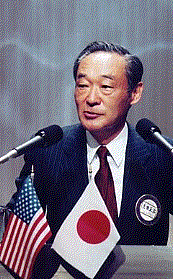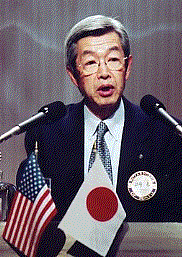Initiation Speech
January 14, 2004
Mr. Masaharu Ikuta
President of the Japan Postal Public Corporation
Mr. Tadashi Ezaki
Chairman of the Shoko Kumiai Chuo Kinko
 Two initiation speeches were made at the meeting of January 14. The first to speak was Mr. Masaharu Ikuta, President of the Japan Postal Public Corporation: The funds we possess total 355 trillion yen with 280,000 regular workers and 400,000 part time workers together with 24,700 post offices comprise our corporation.
Two initiation speeches were made at the meeting of January 14. The first to speak was Mr. Masaharu Ikuta, President of the Japan Postal Public Corporation: The funds we possess total 355 trillion yen with 280,000 regular workers and 400,000 part time workers together with 24,700 post offices comprise our corporation.
We became a public corporation on April 1 last year. We had to determine our corporate philosophy, a charter for conduct and an ecological statement, so we announced an action plan outlining our strategies.
Our international affairs require urgency. Two firms in America, a firm in Germany and another in Holland control international post in the world outside of Asia. No one in Japan seems to have taken of this most important situation for Japan.
As our management vision, we stressed ��straightforward service��, or considering first our customers�� needs. Then, we wish to convert our losing sections to make them profitable. Then the third point was to create a public corporation in which our workers could believe there was a future in they could entrust themselves.
We are trying to heighten productivity by inviting specialists to train our staff. In 2 years�� time we have reduced our staff by 17,000. For our purchasing, we are aiming to reduce costs by 20% from what it was 2 years ago.
For our long haul deliveries, we are now open to bids from the public and believe that we can reduce costs by 30 to 35%.
We must reform our consciousness from being part of the administration to being a member of the service industry. We do not address our customers as being the ��public�� any longer, but consider them to be our clients throughout Japan.
The issue is that of culture. This takes time as culture is created by the periphery.
The Economic Consultation Council has announced the 5 principles of privatization. They are, 1. To reactivate the economy by a transition from public to private. 2. To be consistent with the overall reform of the structure. 3. Reform must be conducted with the aim of enhancing public convenience. 4. Reform must be conducted using the resources of the Postal Public Corporation��s network. 5. Adequate consideration must be given to the Postal Public Corporation��s employment.
To heighten the level of convenience, we must maintain the function of universal service at any cost. I do not mean to say that we must keep the numbers of post offices, but that we mean to maintain the necessary functions.
In the process of maintaining our post office network, we have the one stop convenience office, where assistance can be rendered on administrative matters, and we would welcome convenience stores opening in our premises. We wish to change our post offices into dynamic offices serving the public.
We are at the third major turning point after the Meiji Revolution and the end of the last World War. I wish to make this one in which people will reflect in the future and say that it was a good one.
 The second speaker was Mr. Tadashi Ezaki, Chairman of the Shoko Kumiai Chuo Kinko (Central Bank of Middle and Smaller Merchandisers and Manufacturers�� Associations): We are one of the government policy banks, but differ from other banks in this category.
The second speaker was Mr. Tadashi Ezaki, Chairman of the Shoko Kumiai Chuo Kinko (Central Bank of Middle and Smaller Merchandisers and Manufacturers�� Associations): We are one of the government policy banks, but differ from other banks in this category.
First of all, the circumstances of our birth were quite different.
In 1927, there was an unprecedented panic situation is our financial circles followed by a world depression in 1929 and gold becoming free of control in 1930 which caused great suffering among our middle size and smaller enterprises.
As an effort to rescue such, in 1936 the government created a new Shoko Kumiai Chuo Kinko Law. and invited investors from such Associations while investing government money also. Thus from the outset, our bank became a semi-government bank, and since that time has played an important role by responding to the needs of our middle size and smaller firms.
Today, we are capitalized at 500 billion yen, with 80% being government funds, and 20% private. We have 96 offices with 4,691 employees.
Our most important objective is to support and finance middle and smaller firms in accord with government policy. However, in respect to the money flow of our bank, we conduct our business without monetary assistance from the government, and we lay stress on productivity and good financial health as with any private corporation.
Our money supply is some 12 trillion yen, and this comes from deposits and bond issue, and the only money that we rely on the government is their initial investment of 400 billion yen and ownership of 200 million yen��s worth of our bonds which total only 5% of our funds. However, this government investment has significance in the market as being a government guarantee, and our bonds are highly rated accordingly.
Our clients are the member firms of our member middle size and smaller firms associations of which there are 27,000 or 60% of the total.
Our loans consist of 22% for capital investment, 42% for long term operating funds, and 36% for short term operating funds which total 10 billion yen.
Our loan policy is to put importance on our economic mission and to provide stable funds regardless of prevailing conditions; to support the growth of our clients by long term relations; put importance on the manner of engagement by the business owner to his business and his vision thereof; and to contribute to the development of the local economy.
Based on the conditions in which middle and smaller firms are placed today we consider our task to act as a safety net; and to assist our member firms in starting up new enterprises. Thirdly we wish to diversify the sources of funds for our members. Fourthly, we wish to strengthen our ties with local banking institutions.
Our greatest target is to respond to the need for funds by our members and put our economic recovery on solid ground.